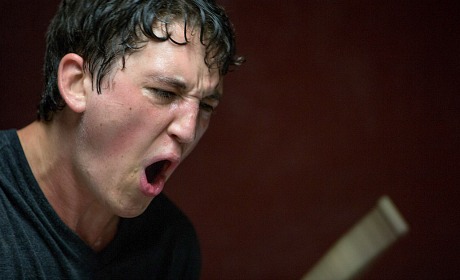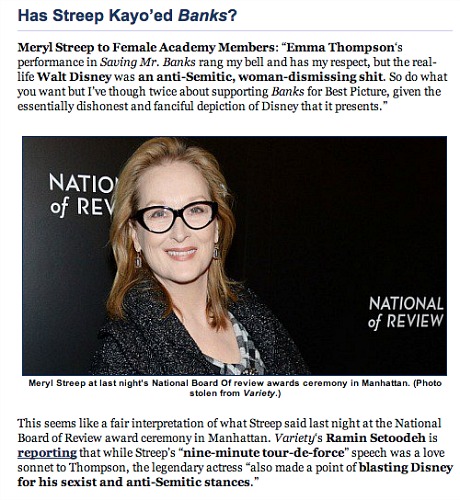The first screening of the day, KStew‘s Camp X-Ray, happens 45 minutes from now (12:30 pm) at Park City’s Eccles auditorium. Three more at the Eccles will follow — God’s Pocket, Laggies and Frank. Spotty, shitty or nonexistent wifi at the Eccles means fewer postings. Twitter if nothing else.
Daily
Draftiest, Must Underheated Hotel Lobby in the World
Park City’s Yarrow hotel is where a good portion of the Sundance Film Festival press screenings happen, and each and every year I’m appalled at how chilly and drafty it always is in the lobby. Even the makeshift screening room feels underheated if there’s not a full house. I wore my overcoat during last night’s half-filled showing of Dinosaur 13. I’ve hung out in several snow lodges (New England, Germany, Italy, Switzerland) and none have had lobby areas as poorly heated as the Yarrow’s. That said, the bar is warm and the restaurant is fine.
Rex Bones
Todd Miller‘s Dinosaur 13 is an intelligent, moderately interesting downer — a story about a group of nice guy dinosaur-fossil hunters in South Dakota getting badly screwed over by the government. Basing the story largely on Peter Larson‘s “Rex Appeal: The Amazing Story of Sue, the Dinosaur That Changed Science, the Law, and My Life,” Miller tells the tale with scrupulous exactitude. The fossilized remains were discovered in August 1990 in the black hills of South Dakota by Larson’s friend, paleontologist Sue Hendrickson (the Rex fossil’s namesake), but the story is mainly about Larson and his paleontologist homies. The film is good and intriguing as far as it goes, but it plods a bit. Especially after it reaches the halfway point and becomes a story about a demimonde of government assholes making Larson’s life hell. We all know the name of that tune. Franz Kafka wrote that tune. Dinosaur 13 is a doc that Tea Party and lefty types can agree on — i.e., there’s nothing like the oppressive hell of being fucked with by the government.
Crash Boom Bang
Damien Chazelle‘s Whiplash, which has been hyped as “Full Metal Jacket at Juilliard”, is a raging two-hander about a gifted drummer named Andrew (Miles Teller). Enrolled at an elite Manhattan music school and determined to be not just proficient or admired but Buddy Rich-great, Andrew is a Bunsen burner. We can see from the get-go he’s going to be increasingly possessed and manic and single-minded about the skins. (All great musicians are like this to varying degrees.) On top of which he really doesn’t want to be like his kindly, failed-writer dad (Paul Reiser), and he can’t find peace with a pretty girl (Melissa Benoist) because she isn’t as consumed as he is — too uncertain and unexceptional.

Miles Teller in Damien Chazelle’s Whiplash, which screened last night at the 2014 Sundance Film Festival.
That’s combustible enough, but Chazelle turns it up with the villain/angel of the piece — a snarling, egg-bald, half-mad music instructor named Terence Fletcher (J.K. Simmons). This guy is definitely not sane and yet he knows what it takes to be great. Andrew recognizes this kindred (if dominating) spirit and wham…we’re off to the races. You know these guys are going to butt heads, and that a lot of emotional-psychological blood will be spilt (along with the actual stuff). This is the super-demanding realm of classic jazz. Everyone listening to Rich and Charlie Parker and other legends of that ilk. Playing the hell out of “Whiplash” and “Cherokee” and dreading Fletcher’s wrath. No pikers, whiners or jerkoffs.
Fletcher is a music-academy variation of F. Lee Ermey‘s Sgt. Hartman in FMJ and Lou Gossett Jr.‘s Sgt. Foley in An Officer and a Gentleman — a foam-at-the-mouth Yoda, a perfectionist, a control freak, a rage junkie and torrential hurricane, motherfucker. Terence is the polar opposite of Reiser — his method is to basically goad and berate and terrorize. Give me 110%, asshole, or I will fuck you like a pig. On second thought get the fuck out of my class. The idea is to challenge and push gifted students past their breaking point, and perhaps (if they’re talented enough) to a level of performance that’s higher than they know they’re capable of.
Bloody Fingers, Dry Bones
I only got about four hours last night due to the early Oscar nomination wakeup. An hour-long nap (4 to 5 pm) is in order. My first 2014 Sundance Film Festival screening will be Damien Chazelle‘s Whiplash (Yarrow, 6:30 pm), a.k.a. “the Julliard drumming movie.” Miles Teller, J.K. Simmons. I’ll have time to bang out a review before the 10 pm screening of Todd Miller‘s Dinosaur 13 (same venue), a doc about the government’s grossly Kafka-esque response to the 1990 discovery of the largest, most complete Tyrannosaurus Rex ever found.

Hear, Hear
“I don’t think it’s telling stories out of class to say that Scott Rudin phoned me up not long ago to talk about the film’s chances, and he was still trying to be optimistic. What I said to him, though, is this: “Inside Llewyn Davis is a film with treasures that reveal themselves to you upon multiple viewings. It is something that does not gratify instantly and asks for you to experience it a few times, if you’re willing, to discover its density. The Oscar season, I told him, has no patience for this sort of thing. And so it played out the way it did this morning.” — from Kris Tapley’s “lamenting Llewyn” Hitfix piece, posted a couple of hours ago.

Back Of Industry’s Hand
I forgot earlier today to attend the Sundance Film Festival opening press conference, during which festival founder Robert Redford always talks a bit and answers questions. Today somebody asked his reaction to being excluded in the Best Actor race — a race that many believed early on was Redford’s to lose. The truth is that he threw in the towel early on. After giving a few interviews in September and October, Redford never campaigned. He never stepped up to the plate and worked it like Bruce Dern or Matthew McConaughey, possibly because All Is Lost‘s poor box-office had convinced him that a nomination wasn’t in the cards.
Perhaps Redford sensed this himself or perhaps the All Is Lost p.r. guys (David Pollick, Michael Lawson) told him this. And then he wasn’t nominated by SAG for an acting nomination, and that’s when award-season handicappers went “uh-oh, he’s in trouble.” I’d been hearing all along that Academy members either didn’t want to see All Is Lost or they would watch the DVD screener and then turn it off after 20 or 30 minutes.
Redford said at today’s press conference that it was basically the fault of Lionsgate, the distributor of All Is Lost. “In our case, we suffered from little to no distribution,” he said. “I don’t know what they were afraid of. They didn’t want to spend money or they were incapable. We had no campaign to cross over into the mainstream.”
Broken Chair
Over the Christmas holidays I rented an Airbnb pad in Manhattan’s Chelsea district. It was actually a very small attic space above a penthouse loft. It had a bed and a desk and a chair and a small table. I couldn’t decide what was more amazing — the fact that the renter, a young woman, had the chtuzpah to charge $150 a night for this little nook or my willingness to pay it. Anyway I stayed there for seven or eight days, but on the fourth day — the night before Christmas Eve — a mishap occured. The desk chair I was sitting in collapsed. I wasn’t doing yoga or handstands or subjecting the chair to any undue strain. I don’t even weigh that much. The chair just said “I quit!” I didn’t tell the young lady immediately because (a) I live in a kind of right-brain dream state and the chair kind of vaporized for a few hours, and (b) I figured nothing could be done repair-wise until after 12.25 anyway.
Camilleri X 2: Wolf Controversy, Oscar Noms
Better late than never to the Wolf of Wall Street controversy, HuffPost’s Ricky Camilleri kicks it around with RogerEbert.com’s Glenn Kenny, Gawker‘s Rich Juzwiak and comedian Sara Benincasa. Also (after the jump): a discussion of the morning’s Oscar nominations (and yet oddly taped before and the noms were actually announced as well as during) with Out.com’s Michael Musto, film critic Kurt Loder and comedian Amanda Seales. Why not wait and tape a reaction to the nominations an hour or two after they’re been announced?
Oscar Nom Analysis (i.e., Gotta Get Out of Here)
So American Hustle is going to take the Best Picture Oscar…right? And I’m probably going to win that $50 bucks from Glenn Kenny after all. Or will Gravity take it? I don’t think so. I think the David O. Russell payback factor that I mentioned a long time ago (the quality and popularity of The Fighter and Silver Linings Playbook added to Hustle means he’ll be almost unbeatable) was one of the reasons Hustle took ten nominations. How odd that Russell’s biggest-ever Academy contender is a film that I like and respect but don’t really love.
The Movie Gods want 12 years A Slave to win Best Picture, naturally. As I do. As a lot of people do. Can the softies be guilt-tripped into admitting that the film’s moral force plus the stunning cinematic artistry injected by Steve McQueen and John Ridley overwhelms or at least balances out the cruelty and brutality? I’d like to think so but…
At 23, Jennifer Lawrence has now been Oscar-nominated three times — for Best Actress in Winter’s Bone in 2011 and Silver Linings Playbook last year (resulting in a win) and now for Best Supporting Actress in American Hustle. She’s the youngest actress ever to have been so honored. Plus she’s really rich and hot and everything else. I loved her in Hustle also, but the award should go to 12 Years A Slave‘s Lupita Nyong’o.
Congratulations to the films that landed the most Oscar nominations this morning — 10 for Hustle and Gravity, 9 for 12 Years A Slave, 6 for Captain Phillips, Dallas Buyers Club and Nebraska, 5 for He and Wolf of Wall Street. And extra double triple quadruple congrats to Wolf of Wall Street‘s Jonah Hill, who surprised everyone (even me) with a Best Supporting Actor nomination. Only one smarty-pants Oscar prognosticator — The Hollywood Reporter’s Scott Feinberg — predicted a Jonah nomination.
Wolf of Wall Street (Yay, Jonah!) Has Been Honorably Saluted
I’m tapping out a reaction piece to this morning’s Oscar nominations, but let’s take a minute to celebrate HE’s three “yay, team!” cartwheel cheers. One, the five nominations for The Wolf of Wall Street (Best Picture, Best Director, Best Actor, Best Supporting Actor, Best Adapted Screenplay). Two, the highly deserved but left-field surprise nomination that went to Wolf‘s Jonah Hill, whose chances weren’t looking very good this morning by the sheer measure of racetrack odds. And three, the shutout of Saving Mr. Banks across the board — no Best Picture nom, no Emma Thompson nom for Best Actress, no Tom Hanks nom for Best Supporting Actor, no Best Screenplay nom for Kelly Marcel…Banks shovelled the Disney corporate blah-blah, the hit pieces had their cumulative effect and Banks went down. (What say you, Scott Feinberg?) Serious question: Which Oscar advocates and columnist big-mouths can claim to have really beat the drum for Jonah, as I did from the get-go? Which Oscar prediction experts foresaw that he might be nominated this morning? This is a major what-the-eff? for the know-it-alls and a major triumph for Mr. Hill. Here’s a post-announcement chat between myself and Sasha Stone, recorded a little after 6 am this morning.



Young Critics About To Jump Into It
I landed in Salt Lake City at 6:45 pm, a shuttle dropped me off at the Park City condo around 8:30 pm, I unpacked my stuff and went right over to Fresh Market to stock up. At the checkout counter I ran into Indiewire critic Eric Kohn and five young critics (Carlos Aguilar, Robert Fowler, Mary Sollosi, Emma Myers, Kyle Burton) participating in a Sundance Institute Fellowship for Film Criticism and funded by the Roger Ebert Memorial Scholarship. (A sixth young critic wasn’t there.) The critics, chosen from roughly 400 applicants, are going to be reviewing films under Kohn’s guidance during the Sundance Film Festival as a kind of rough-and-tumble workshop. Tough deadlines, publicists, long ticket lines, party food, not much sleep, long hours…enjoy Sundance, guys!

(l. to r.) Eric Kohn and five of the six participating critics (l. to r.): Carlos Aguilar, Robert Fowler, Mary Sollosi, Emma Myers, and Kyle Burton…although I’m not 100% sure of the sequence of the names because Kohn sent a needlessly complicated email stating that the names should be regarded counterclockwise. Who says “counterclockwise”?? Everybody says “left to right” when they send along captions.
